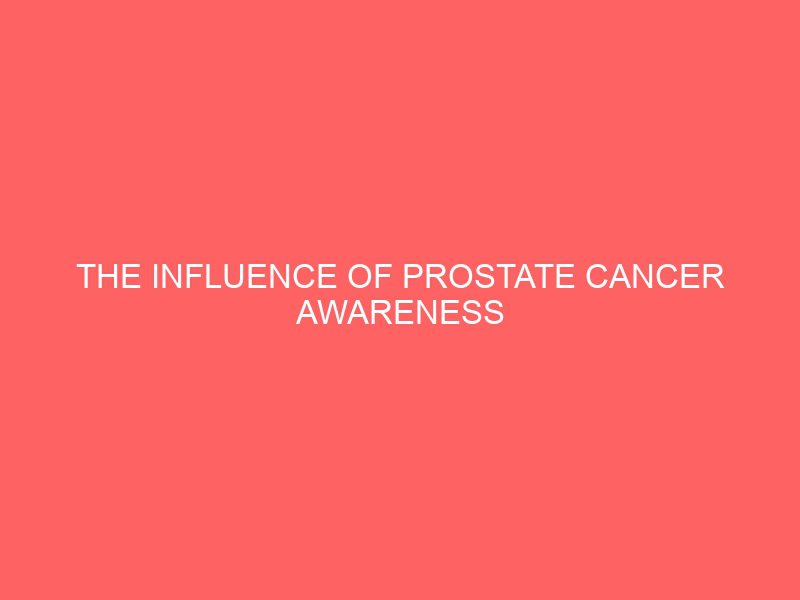Description
THE INFLUENCE OF PROSTATE CANCER AWARENESS CAMPAIGNS ON THE KNOWLEDGE, ATTITUDE AND PRACTICES OF MEN IN SOUTH-EASTERN NIGERIA
ABSTRACT
This study was designed to investigate the influence of Prostate cancer awareness campaigns on the knowledge, attitude and practices of men in South-Eastern Nigeria. The study used survey research design through the instrumentality of questionnaire twenty eight items questionnaire was used as instrument for data collection. The population of the study is 8,184,951 adult males in South-Eastern Nigeria. Five research questions guided the study. The data was analyzed using Statistical Package for Social Science SPSS. The result of the data analyzed revealed that the awareness and knowledge level on prostate cancer is relatively low among the men in South-Eastern Nigeria. Also, most information on prostate cancer were made known to the respondents by medical practitioners, however, those respondents that are exposed to the campaigns agreed that the campaigns have influenced their behavior positively. The study recommended that, awareness campaigns should be well structured to sufficiently address the negative attitudes of men in South-Eastern Nigeria. Also, campaign planners should lower the age for screening, so that early detection and prevention can be detected before it becomes too late.
CHAPTER ONE
INTRODUCTION
1.1 Background of the Study
Cancer is the growth disorder of cells in the body. Clinically, it can be defined as a large number up to a hundred of complex diseases that behave differently depending on the cell types from which they originate William, Klug et.al, 2009, p.513. It is a genetic disease which is caused by mutation that has dominated other cells. In 2000, there were 1,220,100 reported cases of new cancers and 552,200 cancer deaths, indicating that roughly half of the people who develop cancer die from it William, Klug, et.al, 2009, p.513. Statistics emanating from different health organisations and agencies around the world indicate that there are over 16 million new cases of cancer globally. This figure, according to World Health Organization WHO 2011report, is likely to double in 2020 Chustecka, 2011, p.1. The rapid spread of this disease to a large extent is as a result of unawareness of its early symptoms which can be treated at its early stage when detected. Cells proliferation and metastasis nature of cancer has made it worst, this has resulted to its fast spread cancer in human body. Cell proliferation has to do with the division of cells into multiple units which can be said to be characterized by abnormal cell growth. On the other hand, metastasis is a process that allows these cells to spread to other parts of the body. The painful aspect of this disease is the ability to combine both cell proliferation and metastatic, this makes it more dangerous. Peter amp; George, 2002, p. 367.
The International Agency for Research on Cancer IARC, in 2008 gave an estimate of over 681,000 and 512,400 new cases of cancer. These figures have increased to 1.4 million cases and 714 thousand deaths in 2010 IARC Report 2010, p.3. The three most deadly human cancers are cancer of the lung, cancer of the colon and breast cancer. However, lung cancer is largely preventable, most of these cases result from smoking cigarettes American Cancer Society, 2000, p. 13.
There are several causes of cancer, notable among them is the genetic factor. John Hill, an English physician in 1761 discovered that some tumors which can develop to cancer are caused by chemicals. Percival Pott, also made a similar discovery, he discovered that heavy snuff users are exposed to cancer. The 1966 Nobel Prize winner in medicine, Peyton, Rous discovered another cause of cancer. He found out that virus can cause cancer in human Peter amp; George, 2002, p. 368.
Peter and George, 2002, p. 369, stated that, one out of every three children born will contract cancer at some time during their lives. While one fourth of the male children and one third of the female children will someday die of cancer. One begins to wonder what will be the fate of developing nations since the level of knowledge and awareness of this disease is relatively poor in these nations.
The most deadly disease in men is prostate cancer. Prostate cancer is a type of cancer which only affects men. It is the second leading cause of death in men. World Cancer Report 2011, p.4. It occurs when tumor begins to grow in the prostate gland of male reproductive system. The word prostate means one standing in front. The prostate is so called because of its position, which is directly at the base of the bladder. It is estimated that 241,740 new cases of prostate cancer were diagnosed in 2012 in America and out of this number, 28,170 patients will die from this disease America Cancer Society, 2012, p. 23.
This is to show the low level of awareness and attention given to this disease that is gradually sending most men to the grave. Developing nations are seriously at disadvantage when it comes to knowledge and awareness of prostate cancer. Most of the citizens in developing nations have not heard of it talk more of knowing how to detect or treat it at the early stage. However, public campaigns on this have been paramount to governments that have the interest of their citizens at heart.
The questions most people seem to ask are what are the causes of prostate cancer How can it be detected and how can it be treated However, nobody is really sure what the specific causes are. Scientists have been able to come up with possible ideas which are likely to cause it, these include, genetics, age, lifestyle, race, and medications.
Studies over the years indicate that heredity is definitely a cause of prostate cancer. For instance, a man has the tendency of developing prostate cancer if his biological father or brother has it. Age is also one of the causes. The older a man is, the higher is his risk of having it. However, it is rare among men below the age of 45, but very common among men that are 50 and above. Studies have also shown that some diets such as vegetables can reduce a persons chance of developing prostate cancer. Other studies have indicated that lack of some essential vitamins in the body such as vitamin D, a meal rich with red meat may also raise a persons chances of developing prostate cancer. Research studies have equally shown that there might be a link between the daily use of antiinflammatory medicines and prostate cancer. Men who have had gonorrhea have a higher chance of developing prostate cancer. Aside these, there are other causes of prostate cancer in men Peter amp; George, 2002, p. 368.
There are several symptoms of prostate cancer, but at the early stages of prostate cancer, there are usually no symptoms. However, routine medical checkup and blood test can help to show if one has it or not. When symptoms do exist, they are usually one or more of the following:
Painful ejaculation
The patient urinates more often
Atimes there may be some traces of blood in the urine
Most often, he may find it hard to start urinating
Weak erection in most cases.
Treating prostate cancer to a large extent depends on the growth stage of the tumor, age and health condition of the patient are also determinants. However, several types of treatment exist; they include radiation, surgery, hormone therapy or a combination of any of the above mentioned ways Okomanyi, 2012, p. 34. A good number of people might therefore underestimate or over estimate their probability of getting this based on their level of awareness.
The knowledge and attitude of the people of southeastern Nigeria on the subject of discuss forms the fulcrum of this study. The awareness level however, has an information angle, according to a Chinese proverb: the road to health is the road to knowledge and ignoring knowledge is sickness. Secondly, there is the psychological angle where too much of awareness causes guilt, fear, anxiety, depression and negative attitudes of self isolation in patients.
1.2 STATEMENT OF THE PROBLEM
Cancer cells are immortal, until they are uprooted by surgery or the body in which the cell resides dies before one can be said to be free from this disease. Due to the nature of this disease in man, several agencies and organizations such as United Bank for Africa have organized seminars and awareness campaigns on prostate cancer. On Saturday, June 18th 2011, UBA Foundation flagged off an awareness campaign against prostate cancer in Nigeria and Africa, all in a bid to fight cancer. Yet the current statistical data of mortality resulting from prostate cancer is in the increase. Prostate cancer is the most pernicious disease in man, the second highest cause of death in man World Cancer Reports 2011, p.4
Inspite of the Campaigns on cancer generally, death continues to be on the increase. In developing nations like Nigeria, death rate as a result of prostate cancer is very high and mostly among men that are 50 years and above. However, this high death rate can be linked to lack of public awareness, knowledge, late detection and diagnosis of the disease and the attitude of men about the disease. All these lead to the premise that prostate cancer is yet to be well understood by men. However, some people are of the view that any awareness campaign aimed at combating this deadly disease must have all it takes to increase knowledge, create positive attitude and enhance practice of screening methods among the audience. Except there is a significant change in the attitude of those exposed to prostate cancer campaigns, the entire exercise will amount to vanity.
Based on this, this research therefore seeks to find out the extent to which men in southeastern Nigeria are exposed to prostate cancer campaigns, their attitude and practice towards campaign messages on prevention, early detection and treatment of prostate cancer.
1.3 OBJECTIVES OF THE STUDY








Reviews
There are no reviews yet.